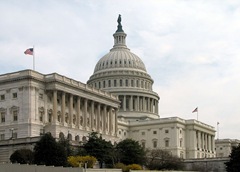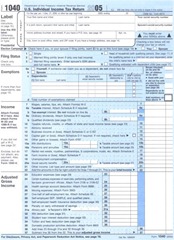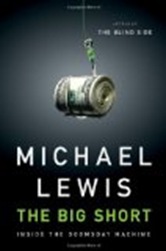I have been giving a lot of thought to the federal budget deficit lately. Well, some thought. Not as much thought as I have been giving FiLife’s March Money Madness 16 blog tournament. I’m pretty sure they had 15 likely blogs and threw in BMA just to round out the field and add some humor.
Alas, I digress. As all us good Republicans know, the first step in closing the budget gap should be a massive reduction in government spending. I’d start with the TSA and agriculture subsidies, but that’s just me.
start with the TSA and agriculture subsidies, but that’s just me.
And we’ve got to cut out these loss-making wars. Next time we invade an oil-rich country we need to actually take the oil. Everybody else will accuse us of going to war to get the stuff anyway, so we might as well cash in.
More digression. Sorry.
A quick glance at the federal spending pie chart will tell you that the bits of the budget that can be cut in the short run are not big enough to eliminate the deficit. (For a further, but somewhat out of date, breakdown that could turn anybody into a libertarian, if not an anarchist, click here.) It breaks my heart to say it, but we need some new taxes. Here are my suggestions.
Read more »
Interest in municipal bonds is seasonal. Every year around this time Americans are reminded how much they pay in taxes and naturally turn their attention to finding ways to pay less. Munis, bonds issued by states, local governments,  assorted agencies, and blessed institutions of same, are a popular place to look. You generally do not owe federal income tax on the interest you get from them, and if the bond was issued inside your own state you generally do not owe state income taxes either.
assorted agencies, and blessed institutions of same, are a popular place to look. You generally do not owe federal income tax on the interest you get from them, and if the bond was issued inside your own state you generally do not owe state income taxes either.
This being the season, there has been a flurry of discussion about investing in munis. (See for example this in the Wall Street Journal.) Not to be left out, here is my primer on the subject.
The first thing to ask yourself before you consider munis is whether or not your income tax rate is high enough to bother. Yes, if you are paying any taxes at all, tax-free interest is better than taxed interest, everything else equal. But everything else is rarely equal in the investment world. Most muni investors are in the very highest tax brackets and they bid the prices up (and the yields down) such that munis make sense only for those paying those highest tax rates.
Read more »
I am sure nobody has noticed, but I have been making an effort to take The New York Times less seriously. This has been hard. This could be because of my New York upbringing or, more likely, the degree to which the Times takes itself seriously. But every time I criticize something in it there is a nagging wonder at the back of my head. Am I holding the Times to a higher standard than I would any other newspaper?
itself seriously. But every time I criticize something in it there is a nagging wonder at the back of my head. Am I holding the Times to a higher standard than I would any other newspaper?
Saturday’s Your Money column When Not to Pay Down a Mortgage is a case in point. The basic thrust of the piece, that paying down your mortgage may not be the best use of your spare cash, is sound. But that point can’t be adequately made without some math and a discussion of the tax code and the article screws up on both. What’s more, what you see if you click on the link above is a corrected version. And it’s still wrong.
Read more »
Just to mix it up a little, I thought that today I would write about something I liked and would recommend to others. Over the weekend I read Michael Lewis’ latest tome, The Big Short: Inside the Doomsday Machine . It’s not bad. Good even.
. It’s not bad. Good even.
 The book tells the intertwined stories of a handful of investors who saw the subprime disaster coming and bet big accordingly. It is not a broad explanation of broader events. That sort of thing is not what Lewis does, and indeed the book’s prologue and epilogue, in which he tries gamely to put his yarn in a larger context, are the weakest portions of the book and might be skipped by the reader in a hurry.
The book tells the intertwined stories of a handful of investors who saw the subprime disaster coming and bet big accordingly. It is not a broad explanation of broader events. That sort of thing is not what Lewis does, and indeed the book’s prologue and epilogue, in which he tries gamely to put his yarn in a larger context, are the weakest portions of the book and might be skipped by the reader in a hurry.
But what Lewis does well, and in this case masterfully, is tell an interesting and entertaining microcosmic story that has wider implications and lessons. If the as yet unwritten full history of the Great Recession could be thought of as a large mural, The Big Short would be an exquisitely rendered corner of that larger, unfinished, painting. It does not actually cover much surface area, but it helps a viewer imagine what the whole work might someday look like.
Read more »
A little more than a year ago the Obama administration announced a scheme to help mortgage borrowers in trouble, in which the loans would be modified in a way that would make the terms more affordable. I thought it was unlikely to  work as promised and said so at the time. The plan was greeted with some widespread skepticism, although a lot less than I thought was warranted.
work as promised and said so at the time. The plan was greeted with some widespread skepticism, although a lot less than I thought was warranted.
At the time, I assumed that what lukewarm enthusiasm it did garner from the media was due to a bias in favor of government intervention in general and this administration in particular. Now I am not so sure. I think it may be that the journalists charged with explaining the scheme to others did not really understand the fundamental flaws so obvious to so many of us.
The latest update on the plan’s progress in the New York Times repeats what has become a recurring theme, that the scheme is at least an order of magnitude less effective than envisioned. But read the text closely and you get the impression of true disappointment and surprise at this failure. The piece contains not a hint of discussion of why the plan failed, as if it was a unfathomable act of nature, rather than something that many thoughtful people accurately predicted from the start. And it ends with finger pointing.
The Treasury is being accused of moving the goalposts a bit. It now says its intention was merely to offer help to those four million borrowers, not to make sure they actually got it.
Read more »
 start with the TSA and agriculture subsidies, but that’s just me.
start with the TSA and agriculture subsidies, but that’s just me.


